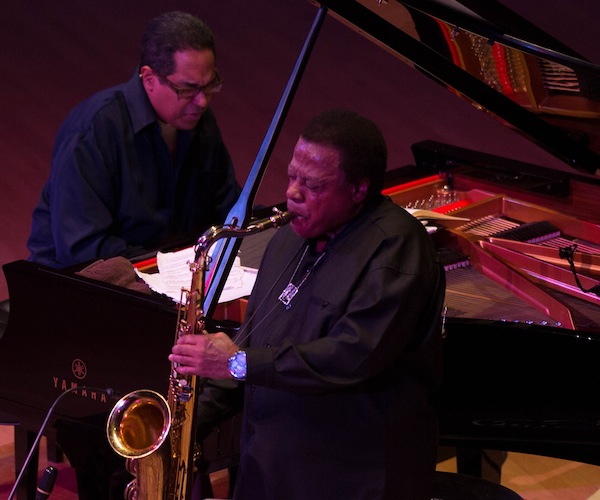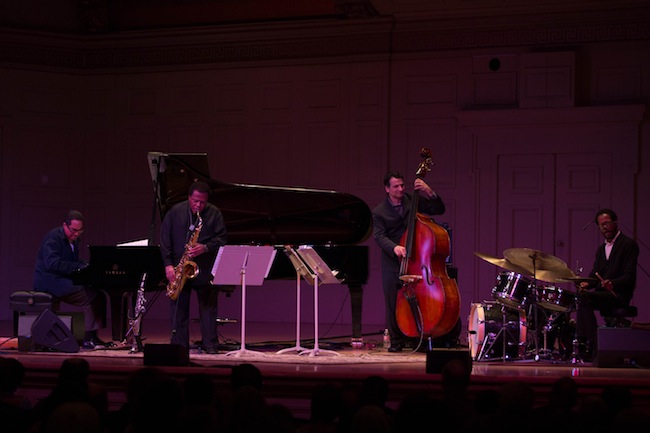Concert Review: Wayne Shorter’s 80th Birthday Celebration — A Memorable Bash
One doesn’t come away from a Wayne Shorter Quartet performance merely raving about individual accomplishments: the set on Sunday night never felt like just a compelling sequence of solos.
Wayne Shorter 80th Birthday Celebration, with the Wayne Shorter Quartet; Sound Points, featuring Joe Lovano and Dave Douglas; the Geri Allen, Esperanza Spaulding, Terri Lynne Carrington Trio. Presented by the Celebrity Series of Boston at Symphony Hall, Boston, MA, on November 24.

Wayne Shorter was front and center in the Celebrity Series of Boston’s 80th Birthday Celebration Concert at Symphony Hall. Photo: Robert Torres
by Michael Ullman
Wayne Shorter is an enigmatic as well as deservedly revered figure in jazz. On his earliest recordings he sounded something like John Coltrane, as did many young tenor saxophonists coming up in the ’50s. Then he began editing himself, turning toward the minimal. In 1963, when he was playing with Miles Davis, he had shaped himself into an oddly spare as well as curiously intense soloist, given to cloudburst of notes and odd squawks interspersed with divinely floating lines. If he chose, he would build intensity slowly, with rapid-fire scalar passages that often ended abruptly. By the end of his tenure with Davis, with compositions such as “Nefertiti,” Shorter had become something of a diffident, if dominant, force. With Weather Report, the famous fusion band he co-led with keyboardist Joe Zawinul, he was just as reticent, or perhaps as choosy, a player, and just as mysteriously influential.
Now 80, he hasn’t changed. Shorter still plays open-ended sets without a net, as his live session here suggests. Via a series of well-chosen sonic gestures from his tenor and soprano, he manages to exert control over his gathering of hyper-active musicians. His efforts don’t always seem to add up to a solo. A fanfare-like line ripples through the band; a placidly held high note calms the storm. At Symphony Hall, Shorter’s set began with a tremolo figure by pianist Danilo Perez over the bowed bass of John Patitucci. The saxophonist entered with a plump single note that he repeated obsessively until even this minimal statement took on a kind of nurturing intensity. The band sounded like an animal coming out of its shell. They then played a ballad introduced by Perez, an indispensable member of the quartet. Its theme was stated by Shorter, who demurred to Perez, who produced a seductive — and virtuosic — solo.
Yet one doesn’t come away from a Shorter Quartet performance merely raving about individual accomplishments: the set on Sunday night never felt like just a compelling sequence of solos. We listened to the group dynamic, as did Shorter himself. At times the leader merely sat in the middle of it all, flinching at a Brian Blade rim shot, smiling at a rippling passage by Perez, and repeatedly almost putting his horn in his mouth to blow a few notes, and then thinking better of it. Shorter waited until he was needed, and then played the perfect phrases with fetching, and knowing, simplicity.

The Wayne Shorter Quartet in their Celebrity Series of Boston 80th Birthday Celebration Concert at Symphony Hall. Photo: Robert Torres
Shorter is as celebrated as a composer as he is as a saxophonist. His pieces are like the poems of Robert Frost, who once said that he liked to write things that sound formulaic but that don’t quite formulate. As transparent and direct as some of his pieces sound, there is always a distinctive Shorter quirk, an odd number of bars, or an unexpected chord change. He manages to write pieces with an unimposing architecture that still manages to sound utterly unique. The sets by the Geri Allen trio and by Sound Points focused on Shorter’s writing, yet each band creatively transformed what he had written, showing that his pieces are both well-formed and provocative. Led by trumpeter Dave Douglas and tenor saxophonist Joe Lovano, Sound Points played a short set that centered on two intriguing Shorter pieces that they commissioned: “Destination Unknown” and “To Sail Beyond the Sunset.” (Many of Shorter’s titles suggest that he is outward bound.) Again, the ensemble work was state of the art, with Joey Baron on drums, Linda Oh on bass, and Berklee graduate Lawrence Fields on piano.
The set by Geri Allen, Esperanza Spaulding, and Terri Lynne Carringon took the shape of a freely evolved sequence of homages to Shorter compositions. At the end of their first piece, Carrington told the audience that they had played “Masquerello,” “Mysterious Traveller,” and “Fall.” Then Spalding whistled the melody of “Virgo” from Shorter’s album Night Dreamer. The highlight of the set may have been their rendition of Shorter’s usually placidly performed composition “Infant Eyes.” The rendition began with a duet between bass and drums and ended with the trio striking out in a wildly exuberant mood, with Allen thumping out the melody in octaves over the enlivened stick work of Carrington. It made for a full evening: as usual, Shorter not only made vital, elusive music, but he was the cause of unusually lively music in others.
Michael Ullman studied classical clarinet and was educated at Harvard, the University of Chicago, and the U. of Michigan, from which he received a PhD in English. The author or co-author of two books on jazz, he has written on jazz and classical music for The Atlantic Monthly, The New Republic, High Fidelity, Stereophile, The Boston Phoenix, The Boston Globe and other venues. His articles on Dickens, Joyce, Kipling, and others have appeared in academic journals. For over 20 years, he has written a bi-monthly jazz column for Fanfare Magazine, for which he also reviews classical music. At Tufts University, he teaches mostly modernist writers in the English Department and jazz and blues history in the Music Department. He plays piano badly.
